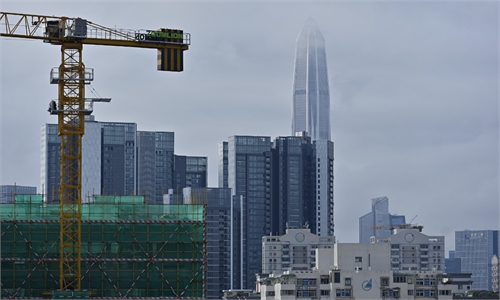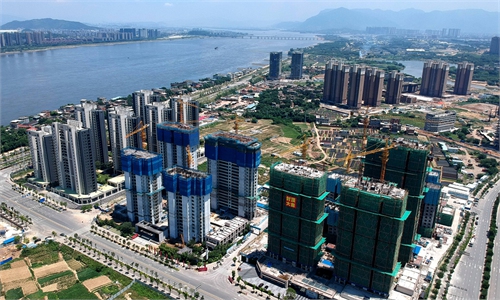
Illustration: Chen Xia/Global Times
To prevent China's real estate market from falling into a downward spiral, the country's central authorities have recently issued a package of 16 measures providing an extended credit line to the financially embattled developers, while loosening previous restrictions on property purchases by home-buyers. The measures are expected to reinvigorate the property sector.Both Chinese and foreign investors have commended the government's new plan to support the healthy and steady development of the real estate industry, as the sector accounts for a proportionate part of the economy. Some economists put it at one-fifth of China's annual GDP. There are concerns that prolonged stress or slump of the property market will likely cause a cascade of negative ripple effects through the whole financial and economic system.
Just as Chinese authorities have announced measures to optimize COVID-19 response to ease pandemic restrictions to encourage mobility and domestic consumption, now it is right time to launch the 16 detailed measures to breathe new life into the urban real estate sector. As broadly expected, China's economy still has a large untapped potential to support many more years of relatively high growth.
The new package of housing market revival measures include instructing the state-owned banks to substantially ramp up loans lending to the sector, while offer financing to assist stronger real estate developers to acquire unfinished housing projects from weaker ones, like the financially battered China Evergrande Group. The measures also allow developers to extend loans and bonds due in the coming six months by as long as 12 months. And, the new policies rule that privately-owned developers may be treated the same as state-owned housing enterprises.
These new policies will largely resolve Chinese developers' severe shortage of liquidity, which has led to stalled or unfinished housing projects scattered across some major cities in the country. Previously concerned home-buyers applauded the new measures, as they are able to get the keys to their new homes and start to renovate them as necessary. In return, developers will be able to buy more land to expand their business, and the banks are able to recoup mortgages from home-buyers. Therefore, a benign housing sector cycle is thus re-established.
For a time, Chinese home-buyers have stayed away over concerns that developers will not be able to deliver apartments which are typically attached to prepaid mortgages. A few months ago, there were media reports claiming some angry home-buyers were refusing to pay mortgages for unfinished apartments, raising concerns over Chinese banks' ability to recover their loans and caused a wave of capital market volatility. In middle 2021, to cut the debt levels of the developers, the Chinese government introduced a policy called "three red lines" that limited developers' ability to raise funds unless their debt ratios were below set thresholds.
Buoyed by the new measures, stocks and bonds of Chinese property developers and banks skyrocketed last week. For instance, shares of Country Garden, the top developer in China, jumped 46 percent last Monday on the Hong Kong stock market.
However, whether the industry will usher in a sustained long-period upswing by consistently boosting property sale depends on other important factors too, typically the society's average income levels and the labor market are key inputs for property sales.
China's rising group of affluent middle class' demand to buy more spacious homes represents massive untapped potential. Earlier, the country's central bank moved to reduce the mortgage rate or the benchmark five-year Loan Prime Rate (LPR) to 4.3 percent, which is sharply lower than levels in most developed countries like the US which now hovers at more than 7 percent. Low mortgage rates attract home-buyers to seal a deal with developers quickly.
Only through addressing both the developers' funding problems and the core issue of weak property sales, can the country's real estate sector be revived which calls for individual Chinese cities to adopt more tailored policies to encourage home buying.
The author is an editor with the Global Times. bizopinion@globaltimes.com.cn



